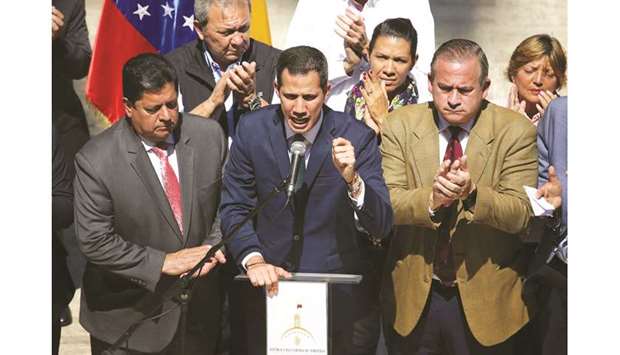Major European nations joined the United States yesterday in recognising opposition leader Juan Guaido as Venezuela’s legitimate head of state, as a separate regional bloc met in Canada to pressure socialist President Nicolas Maduro.
The co-ordinated move by 11 nations including Britain, Germany, France, Spain and seven more European Union members followed the expiration of an ultimatum for Maduro to call a new presidential election, aligning them with Washington and against Russia and China.
“From today, we will spare no effort in helping all Venezuelans achieve freedom, prosperity and harmony,” Spanish Prime Minister Pedro Sanchez said, referring to the decision to recognise Guaido as president.
Maduro’s government, overseeing an economic collapse that has prompted 3mn Venezuelans to flee the oil-rich country, lashed out at the EU nations and said the move would affect relations with Caracas.
In a statement, Venezuela’s government said it “expresses its most energetic rejection of the decision adopted by some European governments, in which they officially submit to the US administration’s strategy to overthrow the legitimate government of President Nicolas Maduro.”
Maduro’s government singled out Spain for acting “cowardly.” Other EU nations taking similar action included: Austria, the Czech Republic, Denmark, Estonia, Poland, Portugal, and Sweden.
Guaido, the head of Venezuela’s National Assembly, declared himself last month as the South American nation’s president. Maduro’s government accuses him of staging a US-directed coup. Maduro has been in power since 2013.
Maduro, who has maintained the critical support of the military, is facing widespread calls from some of Venezuela’s neighbours and others to resign after last year’s disputed presidential vote in the Opec nation of 30mn people. He has defied European heads of state and called them sycophants for following US President Donald Trump.
The sitting Venezuelan president has written a letter to Pope Francis requesting a renewal of dialogue in the crisis, the Vatican Secretary of State, Cardinal Pietro Parolin, said in Abu Dhabi yesterday.
In an interview with Italian broadcaster Sky TG24, of which excerpts were released earlier yesterday, Maduro said he had sent the letter “for help in the process of facilitating and
reinforcing dialogue.”
Although the United States has broached the idea of an oil embargo on Venezuela, the 14-nation Lima Group, meeting in Ottawa, looked set to hold off imposing more sanctions on Maduro’s government, sources briefed on the matter said.
Most members of the group, which includes Canada and Brazil but not the United States, have said Maduro should quit in favour of Guaido and are calling for a new presidential election.
The challenge for participants is that Mexico, a member of the group, opposes any measures to oust Maduro, who also has the backing of Turkey in addition to Russia and China.
The United States also wants Maduro gone.
“How can we continue to support the opposition to keep the pressure up on the regime and push for new elections? Certainly that’s something we’ll be looking at,” a Canadian government official said ahead of the meeting in Ottawa.
Guaido thanked the Lima Group for its “constant support of democracy in Venezuela, our constitution and the struggle that the Venezuelan people have been going through.”
“We are very close to reaching freedom and that is the result of the international support we have received and the recognition of this process of respecting the rule of law and of having a non-violent approach in each of our struggles,” Guaido said in a video.
United Nations Secretary-General Antonio Guterres said UN officials would not participate in any international initiatives on Venezuela in order to
remain neutral.
Maduro said in an interview that aired on Spanish television channel Antena 3 on Sunday: “We don’t accept ultimatums from anyone,” adding: “I refuse to call for elections now – there will be elections in 2024.”
The meeting in Ottawa will also discuss how to aid the people of Venezuela, including through immediate humanitarian assistance, according to the office of Canadian Prime
Minister Justin Trudeau.
Last month, the Lima Group announced a travel ban on senior Venezuelan officials and a freeze on their foreign assets.
The Canadian source, who requested anonymity given the sensitivity of the situation, declined to comment when asked whether more punitive measures could be imposed. Two sources briefed on the talks said such an announcement
was unlikely for now.
Trump’s administration last week issued sanctions on Venezuelan state-owned oil firm PDVSA in a move likely to cut revenues for a country hard hit by medicine shortages and malnutrition.
Trump, in an interview that aired on Sunday, said military intervention in Venezuela was “an option.”

Venezuelan opposition leader Juan Guaido speaks during a news conference at the National Assembly in Caracas yesterday.
